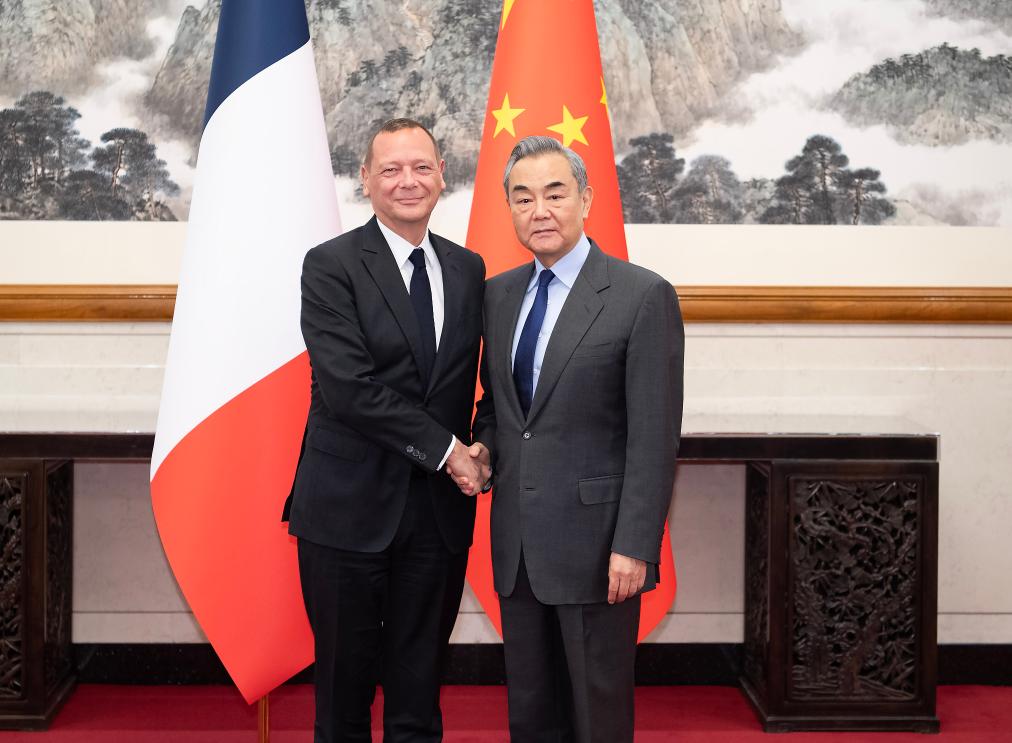
Wang Yi, a member of the Political Bureau of the Communist Party of China Central Committee and director of the Office of the Central Commission for Foreign Affairs, co-chairs the 26th China-France Strategic Dialogue with Emmanuel Bonne, diplomatic adviser to French President, in Beijing, capital of China, Dec 14, 2024. [Photo/Xinhua]
This is an editorial from China Daily.
Sixty years complete one cycle in the traditional Chinese calendar. The 60th year is the point that bridges the past and the future. This year, China and France celebrated the 60th anniversary of the establishment of their diplomatic relations. Sixty years in which the two countries have forged a resilient friendship and mutually beneficial partnership of result-oriented cooperation.
France was one of the first Western nations to offer diplomatic recognition to the People's Republic of China, for this reason, and the generally friendly bilateral ties over the past six decades, Beijing regards France as a dependable partner. It has touted the China-France relationship as an example of countries with different political systems and cultures transcending ideological divergences and getting along.
There are no clashes of fundamental interests between them and there is no reason for not bringing out the best in their relations through the dialogue mechanisms that have been put in place for that purpose.
The 26th China-France Strategic Dialogue was held on Saturday in Beijing between Diplomatic Adviser to the French President Emmanuel Bonne and top Chinese diplomat Wang Yi, who participated in his capacity as a member of the Communist Party of China's political bureau of the Central Committee and director of the Office of the Central Commission for Foreign Affairs. The theme was implementing "important consensuses between the countries' heads of state" and "deepening China-France strategic cooperation", according to a statement of the Chinese Foreign Ministry.
A routine diplomatic meeting such as this would usually merit little particular attention at other times, because, as the Chinese Foreign Ministry indicated in a statement, it was meant not to tackle specific issues, but rather to reaffirm a general mutual commitment, in this case to bilateral strategic cooperation, on which the two sides reached "broad consensuses" through "in-depth communication".
But given the general reassessment of relations with China underway in Europe, prompted by the continent being startled out of its complacent conviction of its place in the world by the conflict in Ukraine, the meeting has drawn more attention than it otherwise would have. Not only because it did dive a little deeper to enumerate the potential realms of bilateral cooperation going forward. But also because it took place at a time when consolidating a mutual commitment to Sino-French cooperation matters more than announcements of specific collaborations.
That the two sides exchanged vows to sustain their strategic cooperation at this point is significant, for, as Wang said, it is regarded as the kick start for "another 60 years" in which the two countries will carry forward their comprehensive strategic partnership, help each other succeed and make progress together. That is indeed something both countries can celebrate.
Paris' role as a leader and staunch advocate for European strategic autonomy naturally appeals to Beijing as the European Union faces mounting pressure from Washington to join a geopolitical campaign to isolate China. For all the differences it may have with China, France has found broad similarities with China when it comes to their positions on key international issues, from political solutions to the ongoing conflicts in Ukraine and the Middle East to UN reforms and climate action. As the Saturday dialogue showed, the two sides have considerable common ground when it comes to strategic autonomy, climate change, multilateralism and UN centrality in global affairs.
The "China-France spirit", which Wang defined on Saturday as "independence and autonomy, mutual understanding, strategic foresight, and mutual benefits", is a vivid illustration of Beijing's ideal of state-to-state relations. As more and more countries find themselves under pressure to take sides in Washington's push for an increasingly divided world, such a formula represents a resolute blow against the push for "camp confrontation". Bonne's reiteration of French opposition to such divisiveness, commitment to independent diplomacy, and advocation of mutual respect and inclusive cooperation in international relations is no doubt conducive to the wide-ranging cooperation the two sides have envisioned.

 中文
中文



